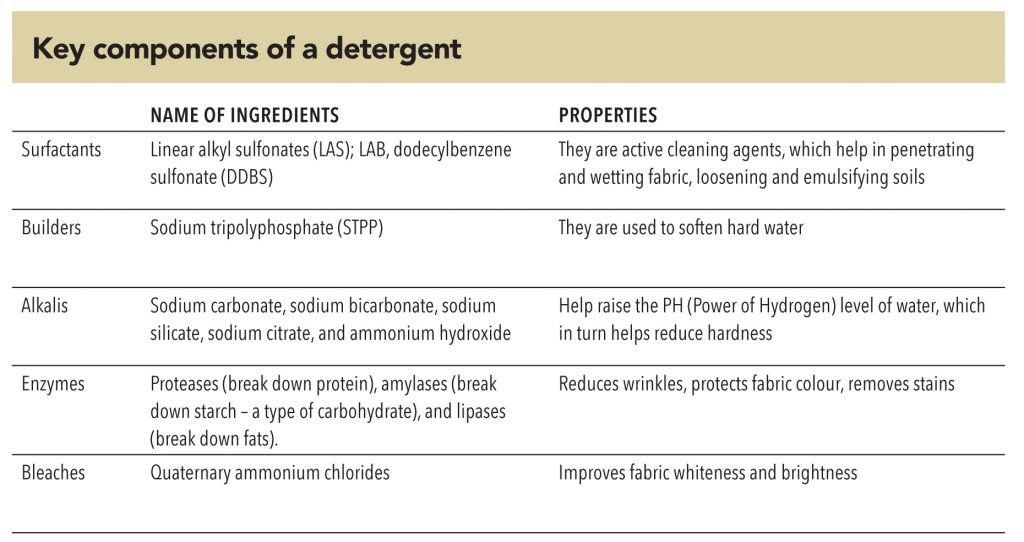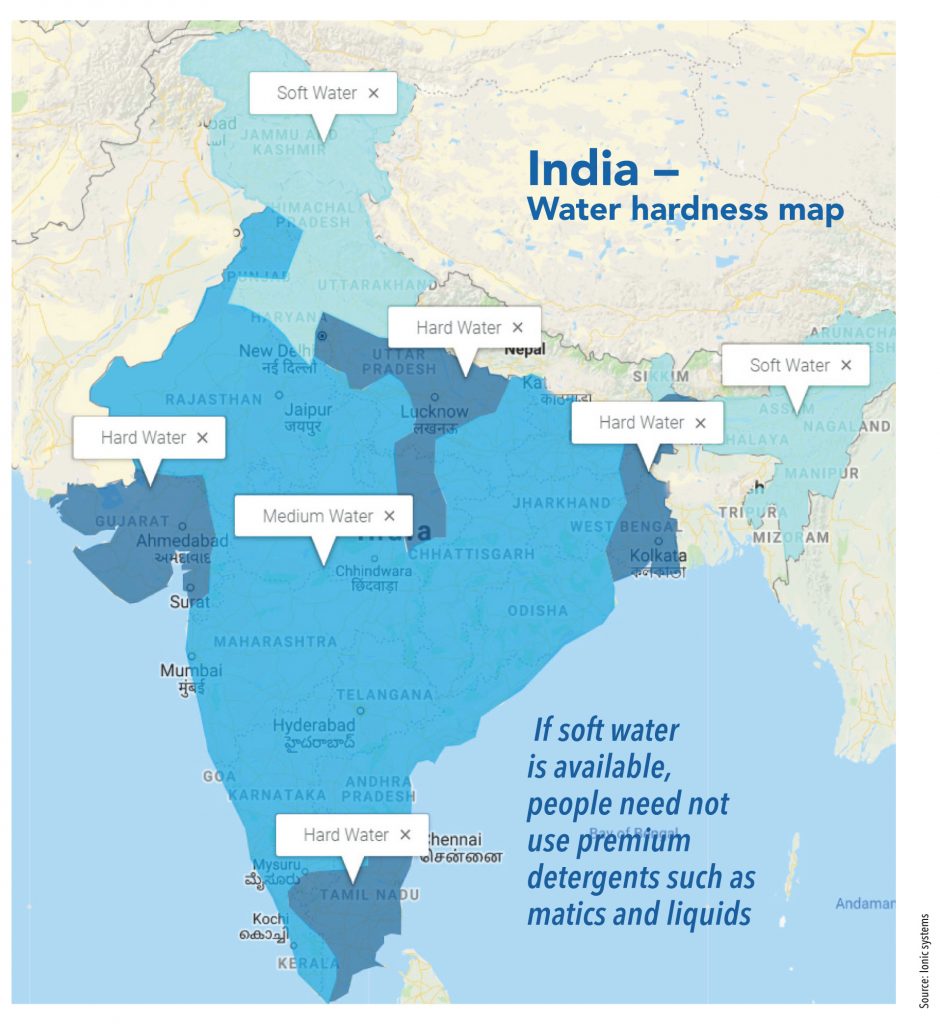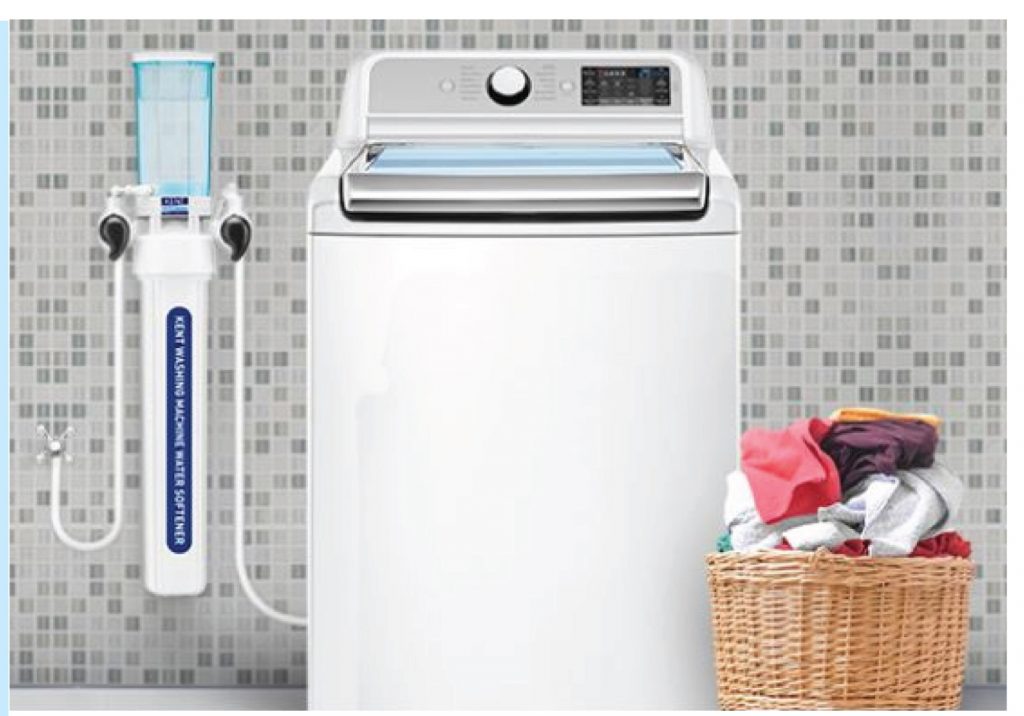For the foreseeable future, India’s hard water problem is unlikely to be resolved, thus driving premiumisation
“Higher the content of active ingredients, better the quality of the detergent powder. So premium detergents soften hard water very quickly, which gives a better quality wash and keeps washing machines in good condition,”
Mohit Agarwal (name changed), a leading contract manufacturer in the detergent segment for HUL, based out of east India.
Apart from the materials that are used to manufacture a detergent, water quality is of prime importance for the detergent to perform well. More than 80% of India’s geographical terrain has hard water (it contains high calcium and magnesium), which makes detergent difficult to dissolve. Magnesium and calcium in hard water can cling to clothing causing fabric to feel stiff and dull colours. Here, active ingredients come into play – these help make hard water soft and improve the performance of the detergent. Higher the content of the active ingredients, better the quality of detergents. Better detergents do not form scum in the machine. Premium detergents (matics and liquid detergents) contains 20-25% active ingredients while mass and popular ones contains only 8-9%.


Can water treatment players resolve the problem of hard water at the household level?
Water treatment players such as Ion Exchange and VA Tech Wabag provide comprehensive and integrated water treatment solutions, but so far, their water-treatment business has been restricted only to B2B clients such as industrial and manufacturing units, hotels, hospitals, and commercial offices – basically those enterprises that can afford the solutions and for whom it is feasible. The water costs for these companies are quite high – more than double the cost at which is water is made available to residential units and societies – making the proposition of water-treatment attractive.
These facilities cost Rs 50-100mn (depending upon the capacity installed) and require physical space, which is scarce in metro/tier-1 cities, making it unviable for residential buildings and complexes. Also, there is regular annual maintenance cost that needs to be incurred to keep these treatment facilities in good condition.
How do water softeners work?
Hard water becomes softer through a process of ion exchange. The positively charged calcium and magnesium ions (+2) in hard water are exchanged with sodium and potassium ions (+1), which also have a positive charge. Each calcium or magnesium ion is exchanged for two sodium or potassium ions, which in turn makes water soft.

The exchange process that makes hard water soft requires the presence of tiny beads of resin in a holding tank. The sodium and potassium ions cling to the resin. When hard water washes over the resin, the sodium and potassium ions are released into the water and exchanged for the calcium and magnesium ion, which are then held fast by the resin beads. Thus, the water flowing out of the system is soft.
Will individual household water softeners harm or aid premiumisation?
These water softeners convert hard water into soft, which generates extra foam and allows the washing process to happen while consuming less detergent. This leads to savings in terms of both detergent and water. To be frank, if soft water is available everywhere, people would need just regular detergents (no enzymes, softeners).. So their desire to upgrade to premium detergents could reduce significantly. Water softeners also enhance the whiteness and lustre of clothes.
Additional positives of water softener machines are that they are non-electric and lead to a better-maintained washing machine. Water softeners also comes with a standby mode for longer life and help prevent scaling (accumulation of germs, dirt, clothes threads) along the walls of the machine, thereby increasing the life and output of washing machines.
However, things are obviously not so simple. Why do these miraculous devices not have a presence in all Indian households? The answer lies is high costs – they cost anywhere between Rs 3,000 to Rs 12,000, need continuous flow of water at higher pressure (which is not there in most parts of India), need space for installation, and they need frequent maintenance.
Our ground checks revealed that the resin beads and membrane, which help make water soft, have to be replaced regularly – just like drinking water filters where cylinders have to be changed every 6-9 months. These resin beads replacements set buyers back by Rs 1,000-1,500 annually. Kent, one of the largest water purifier companies in India, has recently started aggressive advertisements for their washing machine water-softeners, but it has not been able to make much headway due to these challenges.
Subscribe to enjoy uninterrupted access